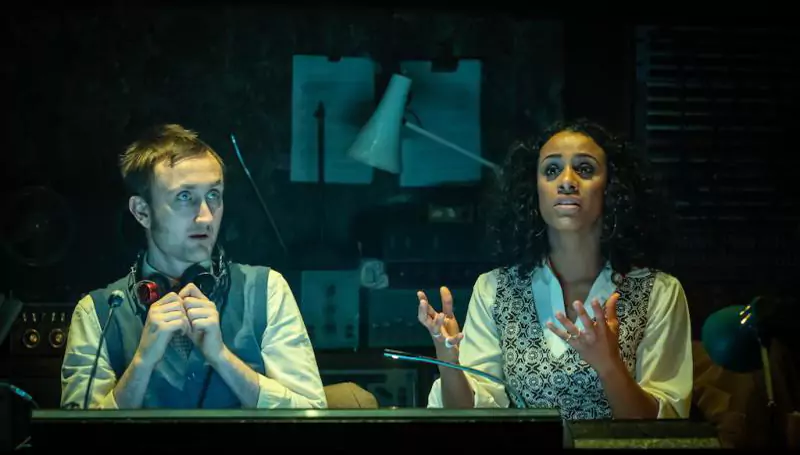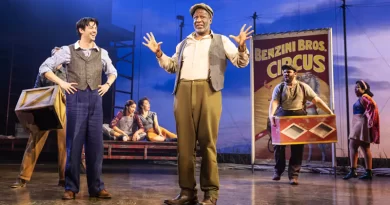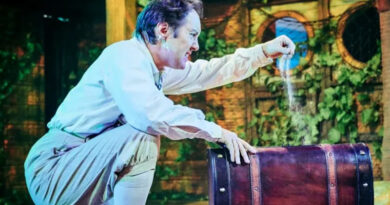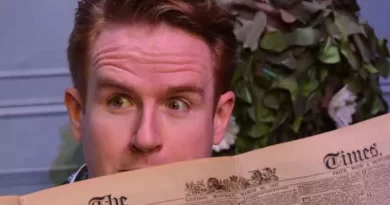“Berberian Sound Studio” at Donmar Warehouse
Jo Briggs in the West End
15 February 2019
Berberian Sound Studio is about what really gets under your skin in horror movies and is not a play for “those of a nervous disposition”, as early viewers of the film The Exorcist were similarly warned. It is based on a screenplay of the same name by Peter Strickland, but the stage conception by Joel Horwood and Tom Scutt, with the script by Horwood and direction by Scutt, is creepier and altogether a more immersive experience than its predecessor as well as being funny. lt is an hour and 40 minutes of increasing exposure to the sound of human brutality, without an interval, so there is no respite to calm down and get your breath back. Be warned.
Its central character is the gentle, introverted sound engineer Gilderoy, played with great charm and warmth by Tom Brooke. He lives with his elderly mother near Box Hill in Surrey, England, where he recorded the soundscape for a moderately successful nature film. Gilderoy has been invited to Italy to create the soundtrack for The Equestrian Vortex, a film he thought, not unreasonably, would be about horses, but he finds himself increasingly out of his depth in the sinister world of 1970s giallo pulp-fiction cinema, where he is required to reproduce the blood-curdling noises of sustained ritual torture.
“They used to ride horses — but not anymore”, comments director Francesco, played by Enzo Cilenti, as it becomes apparent that characters Sylvia and Carla, performed visually and vocally in the film by different actresses, are to be mutilated by priests who suspect them of witchcraft. With opening scenes reminiscent of a classic fish-out-of-water comedy, the play transforms into a psychological spinechiller, exploring the real harm caused by imagined sexual violence, and the blurred lines between sadistic fantasy and the lived experience of women who play it out for the camera or the microphone.
Voice actor Sylvia, ably played by Lara Rossi, has a contractual relationship with her visual parallel, and implies that she can only play voices because of her appearance; when she can no longer scream with sufficient volume and terror, her voice is substituted by another. Neither she nor Carla (Beatrice Scirocchi) have any control over their working lives, and the characters whose voices they play are a collage of pieces of multiple women, cut up and reassembled. The film itself is never shown, increasing the emotional impact of the soundtrack and the depth of our own speculation about the depravity it might display.
The play is billed as being based on the film Berberian Sound Studio, which premiered at the Edinburgh Film Festival in 2012 and starred Toby Jones as Gilderoy, but the play is different in significant ways and makes effective use of the intimacy and immediacy of the Donmar stage. Its set is a perfectly realized wood-panelled post-production studio from the era of reels and analogue tape, with a large, glazed sound-station and a smaller recording booth.
In front is a central space for Foley, the creation of artificial sounds to enhance a dramatic experience. The Foley artists Massimo and Massimo (Hemi Yeroham and Tom Espiner, the latter having worked both as an actor and a Foley artist) are cast in the tradition of Italian clowns: one very tall, one very short, both silent; they make elegant physical comedy out of producing horrifying noises alongside the screams of victims from repurposed kitchen utensils and improvised weapons applied to fruit and vegetables. If you are in the front row, expect to be splattered with the pulp of dismembered watermelons during their killing sprees. Gilderoy’s meticulous cataloguing, storage and retrieval of sounds using a small reel-to-reel machine has echoes of Samuel Beckett’s Krapp’s Last Tape, particularly when Gilderoy attempts to re-experience the safety of home by listening to recordings of his mother’s voice.
Strickland said of the original that he wanted to “make a film where everything that is usually hidden in cinema, the mechanics of film itself, is made ‘visible’. This version of Berberian Sound Studio more than achieves this objective. On a technical level it is a fascinating study of traditional post-production techniques. The visceral grip of the horror genre is enhanced by immediacy of live theatre, and the overall experience demonstrates that — with the right assistance — there is nothing more frightening than your own imagination.









